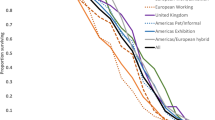Abstract
The aim of this study was to better define the extent of linkage disequilibrium (LD) in populations of large-breed dogs and its variation by breed and chromosomal region. Understanding the extent of LD is a crucial component for successful utilization of genome-wide association studies and allows researchers to better define regions of interest and target candidate genes. Twenty-four Golden Retriever dogs, 28 Rottweiler dogs, and 24 Newfoundland dogs were genotyped for single-nucleotide polymorphism (SNP) data using a high-density SNP array. LD was calculated for all autosomes using Haploview. Decay of the squared correlation coefficient (r 2) was plotted on a per-breed and per-chromosome basis as well as in a genome-wide fashion. The point of 50 % decay of r 2 was used to estimate the difference in extent of LD between breeds. Extent of LD was significantly shorter for Newfoundland dogs based upon 50 % decay of r 2 data at a mean of 344 kb compared to Golden Retriever and Rottweiler dogs at 715 and 834 kb, respectively (P < 0.0001). Notable differences in LD by chromosome were present within each breed and not strictly related to the length of the corresponding chromosome. Extent of LD is breed and chromosome dependent. To our knowledge, this is the first report of SNP-based LD for Newfoundland dogs, the first report based on genome-wide SNPs for Rottweilers, and an almost tenfold improvement in marker density over previous genome-wide studies of LD in Golden Retrievers.



Similar content being viewed by others
References
Alhaddad H, Khan R, Grahn RA et al (2013) Extent of linkage disequilibrium in the domestic cat, Felis silvestris catus, and its breeds. PLoS One 8:e53537
Asher L, Diesel G, Summers JF et al (2009) Inherited defects in pedigreed dogs part 1: disorders related to breed standards. Vet J 182:402–411
Barret JC, Fry B, Maller J et al (2005) Haploview: analysis and visualization of LD and haplotype maps. Bioinformatics 21:253–265
Eberle MA, Rieder MJ, Kruglyak L et al (2006) Allele frequency matching between SNPs reveals an excess of linkage disequilibrium in genic regions of the human genome. PLoS Genet 2:e142
Garcia-Gamez E, Goutam S, Gutierrez-Gill B et al (2012) Linkage disequilibrium and inbreeding estimation in Spanish Churra sheep. BMC Genet 13:43
Gray MM, Granka JM, Bustamante CD et al (2009) Linkage disequilibrium and demographic history of wild and domestic canids. Genetics 181:1493–1505
Hirschhorn JN, Daly MJ (2005) Genome-wide association studies for common diseases and complex traits. Nat Rev Genet 6:95–108
Ke X, Kennedy LJ, Short AD et al (2010) Assessment of the functionality of genome-wide canine SNP arrays and implications for canine disease association studies. Anim Genet 42:181–190
Khatkar MS, Nicholas FW, Collins AR et al (2008) Extent of genome-wide linkage disequilibrium in Australian Holstein-Friesian cattle based on a high-density SNP panel. BMC Genomics 9:187
Lu D, Sargolzaei M, Kelly M et al (2012) Linkage disequilibrium in Angus, Charolais, and Crossbred beef cattle. Front Genet 3:152
McCarthy MI, Abecasis GR, Cardon LR et al (2008) Genome-wide association studies for complex traits: consensus, uncertainty and challenges. Nat Rev Genet 9:356–369
Meurs KM, Kittleson M, Spangler E et al (2000) Nine polymorphisms within the head and hinge region of the feline cardiac beta-myosin heavy chain gene. Anim Genet 31:231
Neale BM (2010) Introduction to linkage disequilibrium, the HapMap and imputation. Cold Spring Harb Protoc 2010(3):pdb.top74
Parker HG (2012) Genomic analyses of modern dog breeds. Mamm Genome 23:19–27
Pritchard JK, Przeworski M (2001) Linkage disequilibrium in humans: models and data. Am J Hum Genet 69:1–14
Purcell S, Neale B, Todd-Brown K et al (2007) PLINK: a toolset for whole-genome association and population-based linkage analysis. Am J Hum Genet 81:559–575
Qanbari S, Pimentel ECG, Tetens J et al (2010) The pattern of linkage disequilibrium in German Holstein cattle. Anim Genet 41:346–356
Quignon P, Herbin L, Cadieu E et al (2007) Canine population structure: assessment and impact of intra-breed stratification on SNP-based association studies. PLoS One 2:e1324. doi:10.1371/journal.pone.0001324
Rimbault M, Ostrander EA (2012) So many doggone traits: mapping genetics of multiple phenotypes in the domestic dog. Hum Mol Genet 21:R52–R57
Simianer H, Szyda J, Ramon G et al (1997) Evidence for individual and between-family variability of the recombination rate in cattle. Mamm Genome 8:830–835
Summers JF, Diesel G, Asher L et al (2010) Inherited defects in pedigree dogs part 2: disorders that are not related to breed standards. Vet J 183:39–45
Sutter NB, Eberle MA, Parker HG et al (2004) Extensive and breed-specific linkage disequilibrium in Canis familiaris. Genome Res 14:2388–2396
Acknowledgments
The authors acknowledge the support of Morris Animal Foundation and Pfizer Animal Health for their fellowship training support of the principal investigator.
Author information
Authors and Affiliations
Corresponding author
Rights and permissions
About this article
Cite this article
Stern, J.A., White, S.N. & Meurs, K.M. Extent of linkage disequilibrium in large-breed dogs: chromosomal and breed variation. Mamm Genome 24, 409–415 (2013). https://doi.org/10.1007/s00335-013-9474-y
Received:
Accepted:
Published:
Issue Date:
DOI: https://doi.org/10.1007/s00335-013-9474-y




